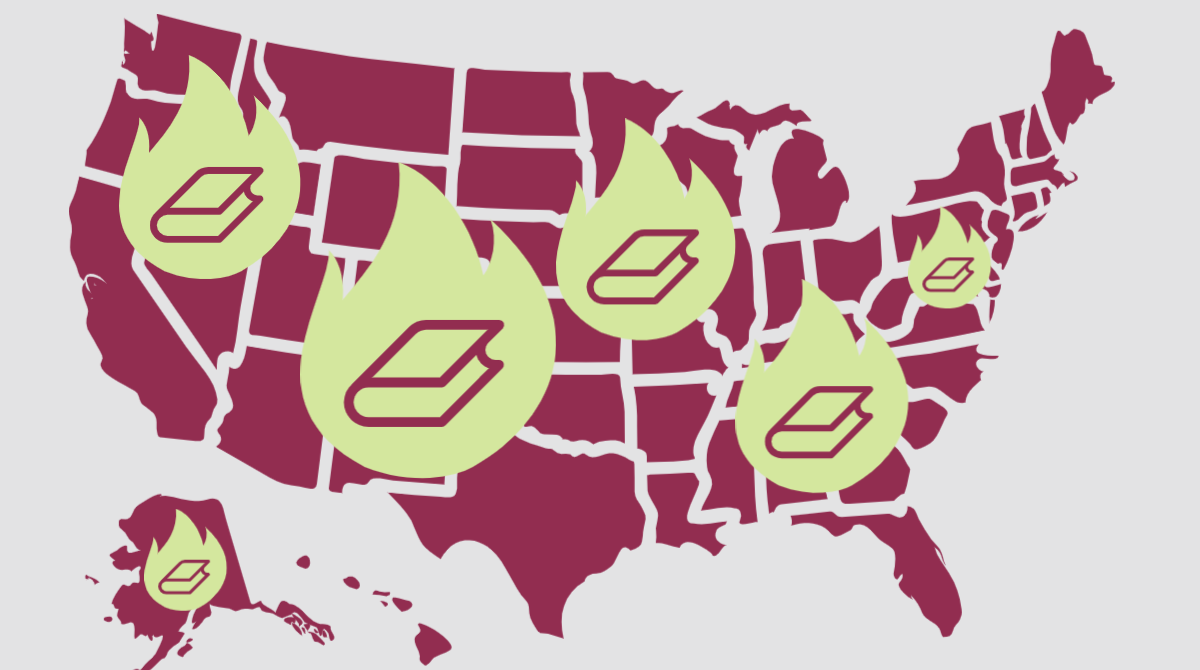Book challenges and bans are increasing in libraries and schools throughout the United States. To help spread the word about these activities and efforts to combat them by librarians, parents, students, politicians, and concerned citizens, I Love Libraries will highlight several stories each week on the current crisis. This roundup includes reports from Florida, Louisiana, Missouri, and Idaho, and more.
Florida teacher starts fundraiser to buy banned books
An English teacher at Bayside High School in Brevard County, Florida, is attempting to distribute books banned from school libraries and curriculum, reports Click Orlando. AP English teacher and author Adam Tritt was told to remove Kurt Vonnegut’s Slaughterhouse-Five from his class, prompting him to start a fundraiser to raise money to buy used copies of books banned in schools and give them to students around the county. In addition to Vonnegut’s book, Tritt will also be handing out copies of This Book is Gay and Not All Boys are Blue.
Bookstore creates project to increase access to banned books
A January decision by Wentzville (Mo.) School District to remove copies of The Bluest Eye, Heavy, Fun Home, and All Boys Aren’t Blue from its libraries has prompted St. Louis-based independent bookstore, Left Bank Books, to launch the Literacy & Justice Project to raise funds to make these books and others more accessible to students and educators, reports Ladue News.
Idaho school board removes books “forever”
Nampa (Idaho) School Board voted in May to remove 22 books permanently from the district’s libraries, reports Idaho Press. The books were brought to the attention of the district and board for allegedly containing “pornography,” according to a board meeting document.
The books that will be permanently removed include Kite Runner, by Khaled Hosseini; The Bluest Eye, by Toni Morrison; The Handmaid’s Tale, by Margaret Atwood; The Perks of Being a Wallflower, by Stephen Chbosky; The Absolutely True Diary of a Part-time Indian, by Sherman Alexie; City of Heavenly Fire, by Cassandra Clare; Eleanor and Park, by Rainbow Rowell; and It’s Perfectly Normal: Changing Bodies, Growing Up, Sex, and Sexual Health, by Robie H. Harris.
Pride Month, Women's History book displays removed from Louisiana library system
Book displays for Pride Month and Women's History Month, among others, have been removed from Lafayette (La.) Public Library System, reports Newsweek. The move, which went into effect on May 26, was an administrative decision by library director Danny Gillane. He told Newsweek that he "didn't ban Pride Month displays" but made a "conscious decision after discussing the matter in house to take the politics out of our displays." He continued: "I am not going to allow displays that focus on a portion of the population—it's all or nothing."
Anti-LGBTQ+ group pushes conservative books into schools
Vice reports that Moms for Liberty, the conservative group behind the recent push to ban books on LGBTQ+ topics from public libraries, has entered the next phase of its mission: pushing public school libraries across the US to accept book donations from conservative publishing companies that promote white supremacist, homophobic, and transphobic ideologies.
Take action
Alarmed by the escalating attempts to censor books? Here are five steps you can take now to protect the freedom to read.
1. Follow news and social media in your community and state to keep apprised of organizations working to censor library or school materials.
2. Show up for library workers at school or library board meetings and speak as a library advocate and community stakeholder who supports a parent’s right to restrict reading materials for their own child but not for all
3. Help provide a safety net for library professionals as they defend intellectual freedom in their communities by giving to the LeRoy C. Merritt Humanitarian Fund.
4. Educate friends, neighbors, and family members about censorship and how it harms communities. Share information from Banned Books Week 2021.
5. Join the Unite Against Book Bans movement to learn what you can do to defend the freedom to read in your community.



